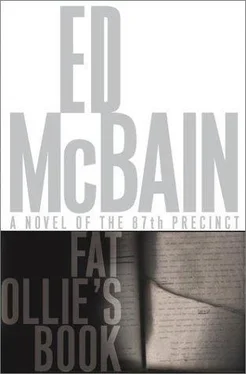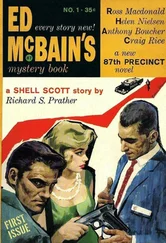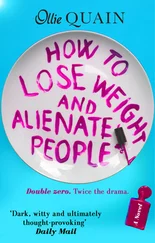Ed McBain - Fat Ollie's Book
Здесь есть возможность читать онлайн «Ed McBain - Fat Ollie's Book» весь текст электронной книги совершенно бесплатно (целиком полную версию без сокращений). В некоторых случаях можно слушать аудио, скачать через торрент в формате fb2 и присутствует краткое содержание. Жанр: Полицейский детектив, на английском языке. Описание произведения, (предисловие) а так же отзывы посетителей доступны на портале библиотеки ЛибКат.
- Название:Fat Ollie's Book
- Автор:
- Жанр:
- Год:неизвестен
- ISBN:нет данных
- Рейтинг книги:4 / 5. Голосов: 1
-
Избранное:Добавить в избранное
- Отзывы:
-
Ваша оценка:
- 80
- 1
- 2
- 3
- 4
- 5
Fat Ollie's Book: краткое содержание, описание и аннотация
Предлагаем к чтению аннотацию, описание, краткое содержание или предисловие (зависит от того, что написал сам автор книги «Fat Ollie's Book»). Если вы не нашли необходимую информацию о книге — напишите в комментариях, мы постараемся отыскать её.
Fat Ollie's Book — читать онлайн бесплатно полную книгу (весь текст) целиком
Ниже представлен текст книги, разбитый по страницам. Система сохранения места последней прочитанной страницы, позволяет с удобством читать онлайн бесплатно книгу «Fat Ollie's Book», без необходимости каждый раз заново искать на чём Вы остановились. Поставьте закладку, и сможете в любой момент перейти на страницу, на которой закончили чтение.
Интервал:
Закладка:
Unless.
Well, this was just supposing.
But suppose there’d been an accomplice? Suppose there’d been two of them in on it,twopeople who wanted the councilman dead for whatever reasons of their own…well, at the Academy they’d been taught there were only two reasons for murder, and those reasons were love or money. Socherchez la femme,honey, or follow the money, cause that’s all there is to know, and all you need to know.
Suppose I shoot him from stage right…
…and I hand off the gun to an accomplice, who goes out the doors on the left side of the building and drops the gun there…
While meanwhile…
Now let’s just hold this a minute, she thought.
No, that’s right,meanwhileI’m on the right side of the building, no gun anymore, and I go strolling away from the building and up the avenue, nothing to attract attention anymore, no gun, no nothing, you solved the fucking crime, Patricia!
So how come nobody saw me? she asked herself.
I pop six caps from the wings there, nobody sees me?
How often do people get shot in this place?
I mean, okay, maybe nobody on thestagegot a good look at me, I’m in the wings, after all, and there must’ve been a lot of confusion, somebody getting shot. But how aboutoffthe stage,backstage,whatever they call it? How aboutthere?Nobody standing there with a broom or a mop? Nobody in the whole damn building who saw me leaving the place—whichever side I left it, right, left, who cares?—nobody saw meleavingthe scene of the crime?
Didn’t Ollie question anybody whoworkshere?
I’ll bet he questionedeverybodywho works here, he’s a good cop, Iguesshe’s a good cop, I’m only a rookie, what do I know? And besides, the patrol sarge is going to start wondering why I’m not out on the beat right this minute, where people might illogically and unreasonably be getting themselves killed.
She looked at her watch.
It was almost lunch time.
She decided she would call in and say she was taking five.
Then, instead of grabbing a bite to eat, she would go into King Memorial for twenty minutes or so, and see if she could scare up a custodian or something.
ALTHOUGH OLLIE’S SISTERonce told him there might have been a touch of the shamrock in their own heritage, he did not particularly like people of Irish descent. Ollie preferred thinking of himself as descending from British aristocracy. He knew for an absolute fact that his ancestry could be traced back to Norman times in England, when—according to the Domesday Book—a lord of the barony of Hastings held a knight’s fief in Wikes, which Ollie supposed was a town, what else could it be? “Wikes” was only one of the variants of the name “Weeks,” just like Weackes or Weacks or Weakes or Weaks or for that matter Weekes. Of course, people whose name was Wykes—of whom there were many, and please don’t write to me, Ollie thought—considered Weeks a variant of their name, same as people named Anne thought Ann was a variant and not vice versa, the world was full of fuckin nuts.
His sister—who always looked on the dim side because she herself was so dim, the jackass—told him he should stop putting on airs since there was absolute proof that there’d been a Robert Weeks living in Walberswick, Suffolk, in the year 1596, and he’d been a mere merchant. In fact, she had looked up his merchant’s mark, and had needle-pointed it into a sampler for Ollie, which he kept in the bathroom, hanging over the toilet bowl.
“Please observe the way the letter ‘W’ is worked into the design,” she’d said, the jackass. She had given him the sampler, framed, for Christmas one year, a gift as worthless as the stolen dispatch case, which was why he was here to see an Irishman like Walsh in the first place.
He greeted Walsh with his favorite Irish joke.
“These two Irishmen walk out of a bar?” he said.
“Yeah?” Walsh said, grinning in anticipation.
“It could happen,” Ollie said, and shrugged.
The grin dropped from Walsh’s face. Ollie guessed the man thought he was making some kind of remark about Irishmen being drunk all the time. Well, if he couldn’t take a joke, a fart on him.
“I’m looking for a cross-dressing whore named Emilio Herrera,” he said, “street name Emmy. Does it ring a bell?”
“I’m still thinking about that so-called joke of yours,” Walsh said.
He was perhaps six feet, two or three inches tall, a big redheaded mick going gray at the temples, wide shoulders, arms like oaks, the butt of a Glock sticking out of a shoulder holster on the left side of his body for an easy right-handed draw. He was in shirtsleeves on this bright April morning, the sleeves rolled up, the collar open, the tie pulled down. Ollie guessed Walsh thought he looked like a TV detective. TV detectives thought they looked like real-life detectives, which they didn’t. Trouble was, real-life detectives watched TV and then started acting like TV detectives, who were acting the way they thought real-life detectives did. It was a vicious cycle. Ollie was glad he looked like himself.
“Don’t worry about jokes,” he said. And then, because he was not only a real-life detective, but also a real-life writer, he added, “Jokes are the folk lore of truth.”
“Does that mean it’s true that two Irishmen can’twalkout of a bar?” Walsh asked.
“It could happen,” Ollie said, and shrugged again.
“That’s what’s offensive about the joke,” Walsh said. “Those words ‘It could happen.’ And the accompanying shrug, indicating that whereas it’s a remote possibility that a pair of Irishmencouldwalk out of a bar, the teller of the joke has certainly neverseensuch a phenomenon in his entire life, though that doesn’t mean to say itcouldn’thappen, two Irishmenwalkingout instead ofstaggeringout or falling down deaddrunkas they come out, is what that joke is saying,” Walsh concluded somewhat heatedly.
“Gee, is that so?” Ollie said, and shook his head in wonder. “I never thought of it that way. Can you help me find this Herrera punk?”
THE MANPatricia spoke to was a Serb named Branislav Something, she couldn’t catch the last name. Something with no vowels in it. He had been working here at the Hall since last December, just about when she’d started on the beat.
“I tink I see you valking around,” he said, grinning. He had bad teeth and patchy hair. He was probably fifty years old, she guessed, and was surprised when he later told her he was only forty-one. He had nice blue eyes. He kept smiling all the while he talked to her. He had been in Kosovo when the Americans bombed, he said. “I don’t blame Americans,” he said, “I blame Albanian bastards.”
“Were you here Monday morning?” she asked him. “When the councilman got shot?”
“Whoo,” he said, and rolled his blue eyes. “Vot a trouble!”
“Where were you?” she asked.
“In toilets,” he said. “Cleaning toilets.”
“Are the toilets anywhere near the stage?”
“Some toilet near, some not,” he said. “You tink I shot councilman?”
“No, no. I just wanted to know if you’d seen anybody running from the stage.”
“Nobody. Saw nobody.”
“Somebody with a gun?”
“Nobody. Saw nobody. Mop floors, wash windows, clean toilets, sinks, everything, make sparkle like new.”
“There are windows in these toilets?” Patricia asked.
“Two toilets got windows,” he said. “Let fresh air come in.”
“Can I see these toilets?”
“Both for men’s,” he said.
“That’s okay,” she said, “I’m a cop.”
When Patricia was eight years old and visiting her grandparents in San Juan, her father took them to a show in one of the big hotels one night, and she had to go to the bathroom after the show, but there was a big line of women out in the hall, the way there always is. He came out of the men’s room and saw her standing there, dancing from foot to foot, and he said, “Come with me, it’s empty in here,” and he took her into the men’s room and stood outside the door to make sure nobody came in while she was peeing. That was the first time she saw urinals.
Читать дальшеИнтервал:
Закладка:
Похожие книги на «Fat Ollie's Book»
Представляем Вашему вниманию похожие книги на «Fat Ollie's Book» списком для выбора. Мы отобрали схожую по названию и смыслу литературу в надежде предоставить читателям больше вариантов отыскать новые, интересные, ещё непрочитанные произведения.
Обсуждение, отзывы о книге «Fat Ollie's Book» и просто собственные мнения читателей. Оставьте ваши комментарии, напишите, что Вы думаете о произведении, его смысле или главных героях. Укажите что конкретно понравилось, а что нет, и почему Вы так считаете.












